- Home
- Susan Hill
Betrayal of Trust Page 9
Betrayal of Trust Read online
Page 9
‘The day they make the Cypriot out of bounds is the day I hand in my warrant card. Canteen would buck up its profits if it didn’t serve muck out of that urn.’
There were usually two or three CID in the small, busy café but today it only held two mothers with pushchairs.
‘Double espresso, one cappuccino, coming up.’
They went to the table in the window. Ben Vanek had been with the force a couple of years now and he had shaped up well. Serrailler had thought him naive at first and had been irritated when the sergeant had followed him about like a puppy. But his romance with DC Steph Mead had blossomed and they had moved into a flat together. Some of her feistiness and ambition had rubbed off on him, though not, Simon was pleased to note, any of her attitude. And Vanek had stopped wearing weird ties and had abandoned his terrible black leather jacket.
‘You got something?’ Serrailler sipped his coffee and scalded his lip. The Cypriot brothers did not serve anything weak or lukewarm. ‘Or just fancied a halloumi cheese butty?’
‘You said maybe five minutes and it wasn’t much more. Neil Marshall, white van driver. Aged fifty-three now. 20 Cherry Road, Langlands.’
‘That’s handy. Still work for the wholesale greengrocer?’
‘Doesn’t say, but I doubt it, guv. He’s on the Sex Offenders’ Register.’
Serrailler whistled. ‘Is he now?’
‘Went down for kiddie-fiddling seven years ago. Cautioned once before that but not charged. On the register since 2004.’
‘Surprised he still lives at the same address then. They usually get as far away as possible – neighbours hate them, they never feel safe.’
He filled Ben in on the Lowther case as they had their second coffees. A couple of the civilian staff came in but no other officers.
‘Can I work on this with you, guv? I’m cheesed off with sitting at my desk all day filling in forms for other people.’
‘But not cheesed off with the drugs op?’
Ben made a face.
‘Good. I’ve got the nod from the Chief for a team – trouble is, I can’t get one together, there aren’t enough spare bods. You’re a start though. Get the file and read up the interviews with Marshall from ’95. Then we’ll nip over and see if he’s at home.’
‘There’s a nasty rumour going round, guv,’ Ben Vanek said as they drove out.
‘Let me guess … we’re losing half of uniform and two-thirds of CID.’
‘We might close altogether, merge with Bevham.’
Serrailler was silent.
‘Guv?’
‘Listen, I don’t know any more than you.’
‘But what do you reckon?’
‘It’d be a last resort. How could a place the size of Lafferton not have its own station, and be served from a city fifteen miles away?’
‘Public wouldn’t buy it?’
‘There’d be riots in the streets.’
Ben relaxed in his seat.
‘Set the rumours flying and they’ll find an open window.’
Simon, though, was less sure than he sounded. A merger with Bevham was unlikely, but after what he had heard about the savings that had to be found, he wasn’t fool enough to rule it out. But if it ever happened, he thought his own police days might be over.
‘Not so long ago, I’d have had half a dozen bods on these cases and now it’s all I can do to get you for a morning. Still, if things really hot up the Chief has promised she’ll find a way to give me what I need.’
‘Looks like they might be hotting up. This Marshall guy has to be in the frame again now, doesn’t he?’
‘One man on the SOR doesn’t make a summer. Right, it’s somewhere in this maze of bungaloid streets.’
They toured around for several minutes, swinging right and left, backing out of cul-de-sacs. No one was about apart from a window cleaner and a couple of dogs.
‘How’s Steph liking the drugs op?’
‘No accounting for taste. She loves it. Getting dealers off the streets and kids off the drugs is her mission. Reckon she’ll head up the squad before she’s thirty. She made herself unpopular with a couple of uniform though – they were apparently all for making drugs legal and she got into a bit of a strop.’
‘There is an argument for decriminalising them. Not sure I support it but there’s a case to be made.’
Ben shook his head. ‘Thing is, guv, there’s the soft drugs and – that was Cherry Road, you just passed it – back, then first left.’
‘Discreet,’ Serrailler said. ‘Out of sight of nosy neighbours.’
But Marshall had seen them draw up. The front door opened and he all but hustled them inside.
‘Thought you’d be here,’ he said. He led them into a cramped front room, made more cramped by a bulky leather sofa and arm chair, and a table on which stood a large half-completed balsa-wood model of St Paul’s Cathedral. More pieces were piled around on sheets of paper, with tiny pots of enamel paint, a jar of brushes, glue, card. The room smelled of it.
Serrailler had his warrant card out but Marshall waved at it. ‘You think I don’t know you lot a mile off? What is it? Way you walk maybe.’
He was a nondescript man, average height, mid-brown hair, rimless glasses. The only notable thing about him was his thinness. Ben Vanek was reminded of a character in a children’s book he had had, a boy so flat he could slide under doors and post himself in an envelope. If Marshall stood sideways, he almost disappeared.
He gestured to them to sit down, then went to the table, picked up a knife and piece of balsa and bent over the model. He studied it in silence for a few seconds, then placed the wood delicately to one side of the great roof.
‘Glue dries,’ he said, ‘if I leave it.’
‘You’ve got a lot of patience.’
‘Have to.’
Serrailler studied the model. As far as he could see there was not a hair out of true. It was a painstaking piece of work, apparently done entirely from an enlarged photograph of the cathedral that was laid out on the table.
‘I know what you’ve come about,’ Marshall said, meeting his eye. ‘Well, I would.’
‘Yes.’
‘I’ve never forgotten her, you know. Might have been yesterday. Clear as yesterday. It just doesn’t happen, does it? You see a girl at a bus stop – next thing, she’s vanished off the face of the earth. Just doesn’t happen.’
‘Unfortunately, it does.’
‘Still, it’s something, I suppose, finding her body. Something for her family.’
‘Something. But not everything.’
‘Do you want a cup of tea?’
‘No thanks.’
‘I knew you’d be round here, even without me being on the register. Got nothing to do with it though.’
‘Hasn’t it?’
Marshall looked up and met Ben Vanek’s eye this time.
‘Nope. Done my time, learned my lesson. Only it’s like tar rubbed into your skin. Never leaves you. Every time I go out.’
‘Is there a Mrs Marshall?’
‘Buggered off with my best mate, once it all came out.’
‘Do you work?’
‘Who employs people like me?’
‘Forget all that,’ Serrailler said. ‘You say you remember Harriet Lowther very clearly … that day you saw her at the bus stop.’
‘Vivid. Close my eyes, she’s there.’
‘Describe it.’
Marshall cut across a triangular piece of balsa, then laid down the knife. But he did not move from the table.
‘I used to drive for Reynard’s Wholesale Greengrocer. Drove for them, what, twelve years? It was a Friday. I was in Parkside Drive … there was a traffic hold-up, not sure why … that’s one thing I’m not so clear about. Bit blurry. I mean, I drove all day, every day. But I was held up. And she was at the bus stop, by herself. I can see her now.’
‘You noticed young girls a lot then?’
Serrailler shot Ben a look.
Marshall
bent over the model and with a pair of tweezers, laid the triangular piece of balsa onto the roof. ‘Haven’t you been through my record with a nit comb, then?’ He stood upright. ‘Because if not, maybe you should.’
‘What are you trying to say, Mr Marshall?’
‘Back to the bus stop.’ Serrailler interrupted quickly. ‘Can you describe her?’
‘Oh yes. Clear as clear. About fourteen, fifteen – young teenage. Fair hair, really fair, like Scandinavian, you know, and tied back. She was carrying a tennis racket in one of those covers. She might have had another bag, I’m not sure. It was her face I remember. She had this look.’
‘Look?’
‘Listen, this’ll sound – well, after the event, you know? I mean, when I saw the photos of her in the papers. But I don’t think it is. She had – an expression. Happy. You don’t see people look happy, just plain happy, do you? They look worried, they look worn down, they’re frowning, or maybe laughing out loud … but this was – just happy. I remember it.’
‘Did she catch the bus?’
‘Not that I saw. Next thing, road was clear and I was on my way.’
‘Thought no more about it?’ Vanek said.
Marshall shook his head. ‘You’re wrong there. I thought about it. I had her happy face in my mind on and off all day. Just this blonde-haired girl with a happy face. Kept me going, you know? And not in the way you’re thinking. Not in that way at all.’
‘And you didn’t see anyone with her, approaching her, talking to her?’
‘No. She was on her own.’
‘Did you see the bus draw up?’
‘No.’
‘Is there anything else at all you remember?’
‘No. Just her. I wished I bloody well had. When I read about her. Wished I’d seen her get on the bus or not get on the bus – wished I’d seen anything. But I didn’t. What happened to her?’ he asked Serrailler. ‘What the hell happened to the poor kid?’
‘It’s my job to find out.’
‘Wish I’d seen something else.’
‘You didn’t stop and talk to her?’ Vanek asked.
Marshall turned. ‘No. I did not.’
‘Give her a lift, maybe? Pretty young girl who caught your eye, couldn’t get her out of your mind. Didn’t maybe go back and pick her up?’
‘No. I did not.’
Serrailler put his card on the table beside the model. ‘If you remember anything else – even something very small and you think of no significance – please ring me.’ He bent again to look closely at the model. ‘It’s good,’ he said. ‘From just a photograph.’
‘Yes, well, I have a lot of time on my hands, don’t I? Started doing it inside. It got to me.’
‘Keep them all in the attic, do you?’ Vanek asked.
‘I don’t. They get auctioned. Raise money.’
‘Oh yes?’
‘Children in Need. Nine thousand pounds in six years, if you want to know.’
‘That’s sick,’ the sergeant said getting into the car. ‘Children in Need!’
‘So what would you rather he did? Stuff them in the attic like you said?’
‘Might choose a different good cause. You know, cancer or something.’
‘Maybe he thinks he’s still paying. Still trying to make it good.’
Vanek sniffed. ‘I shouldn’t say it, but I hate paedophiles.’
‘That much,’ Simon said, putting his foot down, ‘is obvious. Don’t let it cloud your judgement.’
‘So you reckon he’s in the clear?’
‘I don’t think he killed Harriet Lowther. I don’t think he went back or spoke to her or gave her a lift. But that’s just my hunch. He’s still on my list.’
Vanek’s phone rang. He made a face. ‘Can you make a detour to the Eric Anderson, guv? Drop me by the underpass?’
‘Am I losing you to this bloody drugs op?’
‘Nah. Don’t forget my bad foot. Only they want me to do an ID.’
‘Get them to bring you back then.’
As they pulled up, Ben said, ‘Sorry.’
‘What for?’
‘I was a bit out of order there.’
‘Listen, Ben. Paedophiles are a grubby bunch. But don’t turn a distaste into a blind prejudice, that’s all.’
‘Guv.’
At the station, it took Serrailler only a few minutes to find details of all the charges against Marshall. He had been convicted on four counts of indecent assault, and asked for a number of others to be taken into consideration. He had pleaded guilty on all counts. Each one of the offences was against boys, aged between eight and twelve.
Simon sent an internal email to Ben Vanek, picked up more files, and left, not driving straight home but to Hallam House, where there was an unfamiliar car parked next to Judith’s blue Polo in the drive. He was about to leave again when he saw his stepmother at the kitchen window, waving.
‘Are you here for lunch?’
‘No, I’m off home to get my head down to work, but I wanted to ask you something.’
‘Well, at least have a drink – beer? Whatever. Come into the sitting room and say hello to Emma.’
Emma.
She stood up and held out her hand. A small, very slender woman with pretty features, pretty auburn hair, a pretty smile. Her eyes were thoughtful.
‘Do you want a beer?’
‘Better not. Is it too late for coffee? I’ll do it.’
‘No, talk to Emma about her new bookshop in the Lanes.’
‘Will you excuse me?’ he said to Emma. ‘I need to ask Judith something before I forget.’
He would not have forgotten. But somehow he did not want to be alone in the sitting room with this disturbingly pretty woman.
In the kitchen, Judith said warningly: ‘Simon?’
‘No, listen. Could you do me a huge favour?’
‘Try me.’
He told her about the banquet.
‘I can’t get out of it, Cat won’t give up her choir night –’
‘And we’re going to stay with the Devereuxs in Oxford – they’re taking us to see Iolanthe, which, as you know, always makes your father twenty years younger. I just can’t.’
‘Bugger. Sorry.’
Judith nodded in the direction of the sitting room.
‘Divorced,’ she whispered.
He made a face at her, but, when his coffee was ready, took it through and chatted to Emma.
‘Lafferton,’ he said, ‘needs a good bookshop. Waterstone’s closed, the old independent closed – all we have is one antiquarian and W.H. Smith. But you’re brave, aren’t you?’
‘I’m terrified. But I was manager of a branch of Blackwell’s in Edinburgh for seven years. I wouldn’t forgive myself if I didn’t give it a serious try.’
‘Which premises?’
‘Where the expensive shoe and handbag shop used to be. I gather it didn’t last long. I’d have been open now but of course the floods have set everything back. Thank God I hadn’t moved in any stock – just some shelving and that will be OK with fresh paint. The floor suffered though. I’ve had to replace that.’
‘Will you specialise?’
‘No. But I’m going to have a book club, some author events, children’s story mornings. And try to stock books you don’t find everywhere. I’d like to surprise people – challenge them even.’
She was very relaxed, with a confidence he found attractive. And she was pretty. How old? Late forties?
He wondered about the banquet.
Judith called, ‘Are you staying for lunch?’
Was he?
He stood up. ‘Thanks, but I mustn’t. I’m short-handed and I’ve got six hours’ worth of files in the car.’
‘Are you on the inquiry into the bodies of those poor girls? Sorry, you probably can’t answer. I don’t know about police protocol.’
‘It’s fine. Yes, I am.’
‘It makes me want to weep. Some young woman disappears for years and no one notices
she’s missing? That can’t be right. Surely to God there’s a parent, a partner? How old was she?’
‘Probably a bit older than Harriet Lowther.’
‘Is there a connection between them?’
Simon shrugged and put out his hand. Emma’s was very smooth, and cool.
Could he ask a woman he had barely met to a banquet?
He said, ‘I’ll come in and buy some books.’
‘Please do. I’m opening Tuesday week, assuming no further floods.’ She smiled. A nice smile.
As he kissed Judith at the door, she gave him a sharp look but said only, ‘Lovely to see you, darling. And I wish I could have come with you.’
‘I’ll find someone,’ Simon said.
Sixteen
DID THE HOUSE smell of cat? Lenny went outside. It was drizzling a bit and she held onto the rail so as not to fall. Falling was one of the few things she feared, falling and lying there undiscovered, perhaps for days.
She filled her lungs with the damp air and went back into the cottage.
There was the faintest smell of cat. But female cats only smelled if you did not remember to let them out. She must remember. She had read about cat flaps but disliked the thought of having an entrance to the house that she could not control.
And then the telephone started. She was on her way into the music room and had to go all the way back.
It stopped as she reached it.
She returned to the music room. It was still called the music room though no one played there now apart from herself. But she played. So she would continue to call it the music room. Yes.
She closed the door and drew the velour curtain to keep out the draught, switched on the lamp.
There was a Beethoven sonata on the stand but she rummaged in the pile on the floor. The floor, the piano itself, the table, the window ledge. Satie. She wanted to play Satie. Where was Satie?
The phone was ringing again. Then stopped again. She’d been told there was a way you could find out who had rung you, but what was it? Who knew?
It did not ring again but the doorbell did.
‘Leonora Wilcox? Packet to sign for.’
Miss Wilcox to you, she would have corrected once upon a time. But you gave up. She couldn’t be bothered.
The package was music but not Satie.

 Mrs De Winter
Mrs De Winter A Question of Identity
A Question of Identity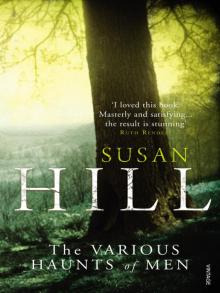 The Various Haunts of Men
The Various Haunts of Men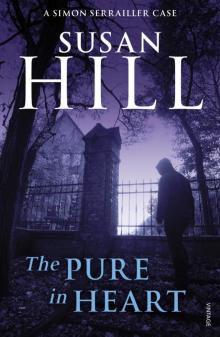 The Pure in Heart
The Pure in Heart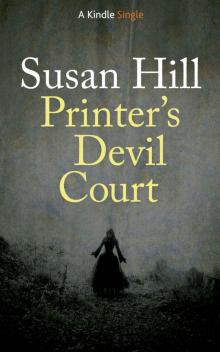 Printer's Devil Court
Printer's Devil Court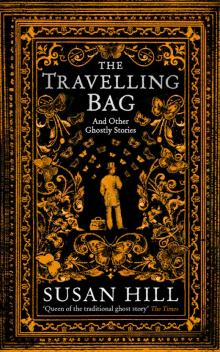 The Travelling Bag
The Travelling Bag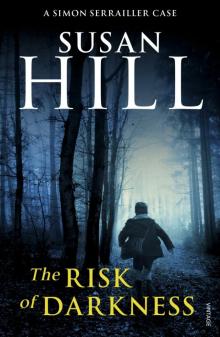 The Risk of Darkness
The Risk of Darkness A Kind Man
A Kind Man Black Sheep
Black Sheep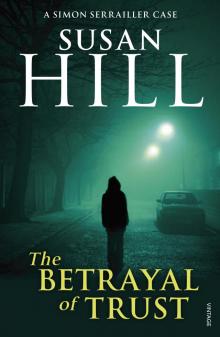 The Betrayal of Trust
The Betrayal of Trust The Service of Clouds
The Service of Clouds Betrayal of Trust
Betrayal of Trust The Small Hand
The Small Hand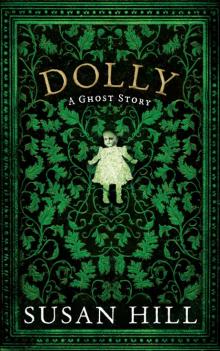 Dolly
Dolly Jacob's Room Is Full of Books: A Year of Reading
Jacob's Room Is Full of Books: A Year of Reading The Vows of Silence
The Vows of Silence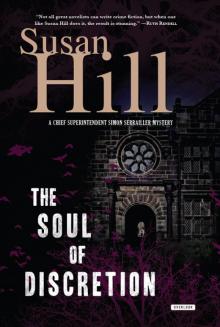 The Soul of Discretion
The Soul of Discretion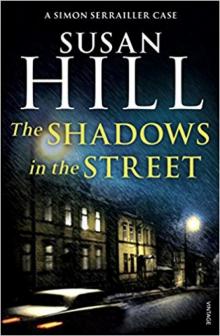 The Shadows in the Street
The Shadows in the Street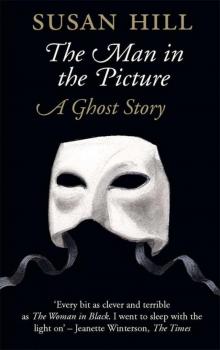 The Man in the Picture
The Man in the Picture Air and Angels
Air and Angels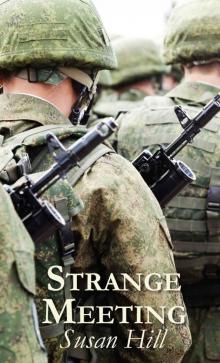 Strange Meeting
Strange Meeting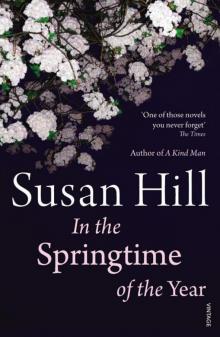 In the Springtime of the Year
In the Springtime of the Year Howards End Is on the Landing: A Year of Reading From Home
Howards End Is on the Landing: A Year of Reading From Home From the Heart
From the Heart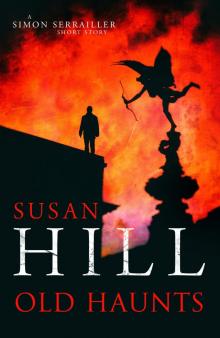 Old Haunts
Old Haunts The Mist in the Mirror
The Mist in the Mirror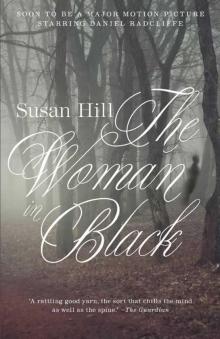 The Woman in Black: A Ghost Story
The Woman in Black: A Ghost Story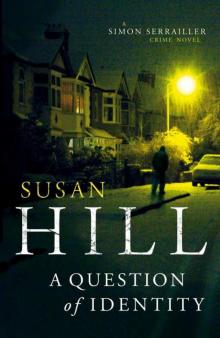 A Question of Identity (Simon Serrailler 7)
A Question of Identity (Simon Serrailler 7) The Comforts of Home
The Comforts of Home Mist in the Mirror
Mist in the Mirror Jacob's Room is Full of Books
Jacob's Room is Full of Books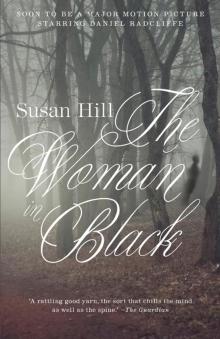 The Woman in Black
The Woman in Black Howards End is on the Landing
Howards End is on the Landing